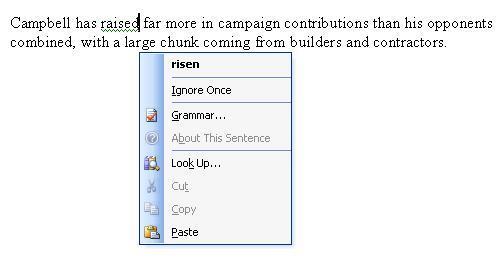February 21, 2008
A grammatical Cupertino?
On the American Dialect Society mailing list, Ron Butters notes an unusual sentence appearing in today's Orlando Sentinel:
Ron wonders,
Perhaps this is just a typo that both the author and editor missed — or a hypercorrection — or do people really normally use "risen" as the past participle of "raise"?
I suspect this is neither a hypercorrection nor a variant usage. Instead, I see it as a twist on the Cupertino effect, but in this case a grammar checker instead of a spell-checker is to blame.
On a hunch, I typed the original sentence in Microsoft Word 2003, using raised instead of risen, and then ran it through the grammar checker. Sure enough, raised was the one "mistake" that got flagged:

It's a rather odd "incorrection" for MS Word to make. I could understand the grammar checker flagging "has rised," but "has raised" is, by and large, used in a perfectly grammatical fashion — very often in the exact context of the Orlando Sentinel article, specifiying how much money a candidate has raised. It looks like Geoff Pullum was right on the money when he wrote, "For the most part, accepting the advice of a computer grammar checker on your prose will make it much worse, sometimes hilariously incoherent."
[Update #1: Further enlightenment from ADS-L, first from Arnold Zwicky:
interestingly, the original *has* a reading, parallel to
Cambpell has risen far more in net worth than ...(with "far more in ..." serving as an extent adverbial) but this wasn't the reading intended above (where "far more in ..." is a direct object). so why should the grammar checker go after "raised"?
perhaps because using forms of RAISE where RISE is called for is a moderately common error, treated (not always well) in lots of advice manuals. the reverse error is much less common.
but more is going on here, since my grammar checker (correctly) catches at least some occurrences of RISE for RAISE, as in:
Campbell has risen more children than his siblings.(and it correctly raises no objection to the versions of these with "raised").
Campbell has risen a lot of money.
on the other hand, it incorrects "risen" to "raised" inCampbell has risen a lot further than I have. Campbell has risen a lot more than I have.so it looks like the program has some scheme for detecting direct objects -- well, NPs following a verb -- but the program isn't very good at distinguishing NPs from adverbials (because that would involve, umm, actually understanding the sentences).
And from Larry Horn:
You observe in the LL post that
It's a rather odd "incorrection" for MS Word to make. I could understand the grammar checker flagging "has rised," but "has raised" is, by and large, used in a perfectly grammatical fashion - very often in the exact context of the Orlando Sentinel article, specifiying how much money a candidate has raised.But in fact if the Sentinel reporter had written and spell-checked notCampbell has raised far more in campaign contributions than both his opponents combined.but ratherCampbell has raised more campaign contributions than both his opponents combined.no incorrection to "risen" would have been suggested. It's not the "has raised" that has raised (*risen) the spell-checker's red flag but the "(has) raised...in...", which it took (incorrectly, but plausibly) to signal the presence of an intransitive "rise/risen" as opposed to a transitive "raise/raised". (On the model of "You've raised my expectations/You've risen in my expectations".) In the case at issue, "raise" is a transitive verb being used absolutely, but you'll have to admit that's a pretty subtle point for the spell-check to be expected to grasp.
Meanwhile, Ron Butters wants to know if we can call this sort of error a typocorrection.]
[Update #2: Ron contacted the reporter directly, and she confirms that this was indeed a grammatical Cupertino. And from the other side of the computational transaction that led to the error comes this from James Lyle of the Microsoft Natural Language Group (a colleague of Thierry Fontenelle):
Posted by Benjamin Zimmer at February 21, 2008 11:52 AMIt is of course too bad that the grammar checker got this one wrong (rats!) but this sentence is a nice example of why grammar checking is hard—it's actually not a very odd incorrection for the GC to make, because of the ambiguous reading of "far more". I'm guessing the GC not unreasonably preferred the parse in which "far more" has an adverbial reading, as in the almost identical "Campbell has risen far more in the polls than his opponents combined...". In sentences with a less ambiguous direct object for "raise", e.g. "Campbell has raised far more money than his opponents..." the GC correctly doesn't flag any error.
]
This kind of problem is all too common (people still being smarter than computers, as we've blogged about before), so no grammar checker yet can be anywhere near perfect, as you and Geoff Pullum point out. The best we can hope for is to be right a lot more often than we're wrong (which fortunately we are, when you look across all our customers and the uses to which they put MS Word!).
